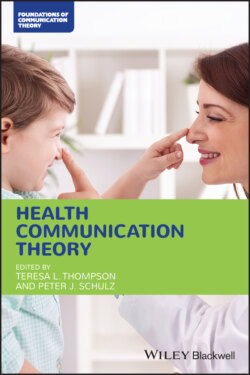Читать книгу Health Communication Theory - Группа авторов - Страница 34
Philosophical Foundations
ОглавлениеInterpretive/critical scholars approach knowledge and the world in very different ways from post‐positivist theorists. Rather than engaging in a scientific search for universal explanations and causal relationships, interpretive/critical theorists instead seek in‐depth understandings of social life and lived experiences. For them, reality is subjective, multiple, and socially constructed, with participants creating, interpreting, and challenging shared meanings through communicative behavior. People build their own understandings from cultural norms, values, and beliefs, and these understandings then evolve and develop through interaction. Because we come to agreement about what is real intersubjectively, interpretive/critical scholarship does not measure the (in)accuracies of messages against an objective reality; instead, researchers embrace their own subjectivity and acknowledge that they are “interpreting others’ interpretations” (Zoller and Kline 2008, p. 93). In this double hermeneutic (Giddens 1984), interpretive/critical scholars seek to understand socially constructed realities and, in doing so, contribute to them, as well. While interpretive scholars strive for thick description of a particular context, critical scholars examine how communication in health contexts creates, reproduces, or challenges dominant power relations and ideologies (Zoller and Kline 2008).
Miller (2005) distinguished between theories that (i) examine general processes of meaning construction for consideration across situational boundaries and (ii) seek to understand local and emergent communication phenomena in specific situations and contexts (see also Dutta and Zoller 2008). Some of these theories are discussed elsewhere in this book (see, for example, Chapters 4, 5, 13, and 14). Regardless, interpretive/critical research is often viewed as “an ongoing process in which there is a continual intertwining – even a blurring – of data collection, analysis, and theorizing” (Miller 2005, p. 63). Just as meaning arises in interaction, concepts and issues of study emerge through the research process itself. Thus, like the social reality being theorized about, interpretive/critical theory is created inductively through observation and interaction. Rejecting the desirability or possibility of separating the knower from the known, researchers immerse themselves in local contexts, combine qualitative methods with their own perspectives and experiences, and seek inside understandings in research conducted jointly with participants. Accordingly, a single study often represents several theoretical commitments (e.g. grounded theory, ethnography, and narrative analysis) in what is usually a back‐and‐forth, rather than linear, process (Zoller and Kline 2008).
The following theoretical frameworks serve as popular, robust examples of the continual intertwining of data collection, analysis, and theorizing in interpretive/critical health communication research. As Zoller and Kline (2008) note, they overlap and may be employed alone as combined theory and method or used as theory, method, or both with other approaches. I offer exemplary scholarship throughout the chapter – with a focus on theory rather than method – to illustrate their growing and influential contributions to heath communication research.
